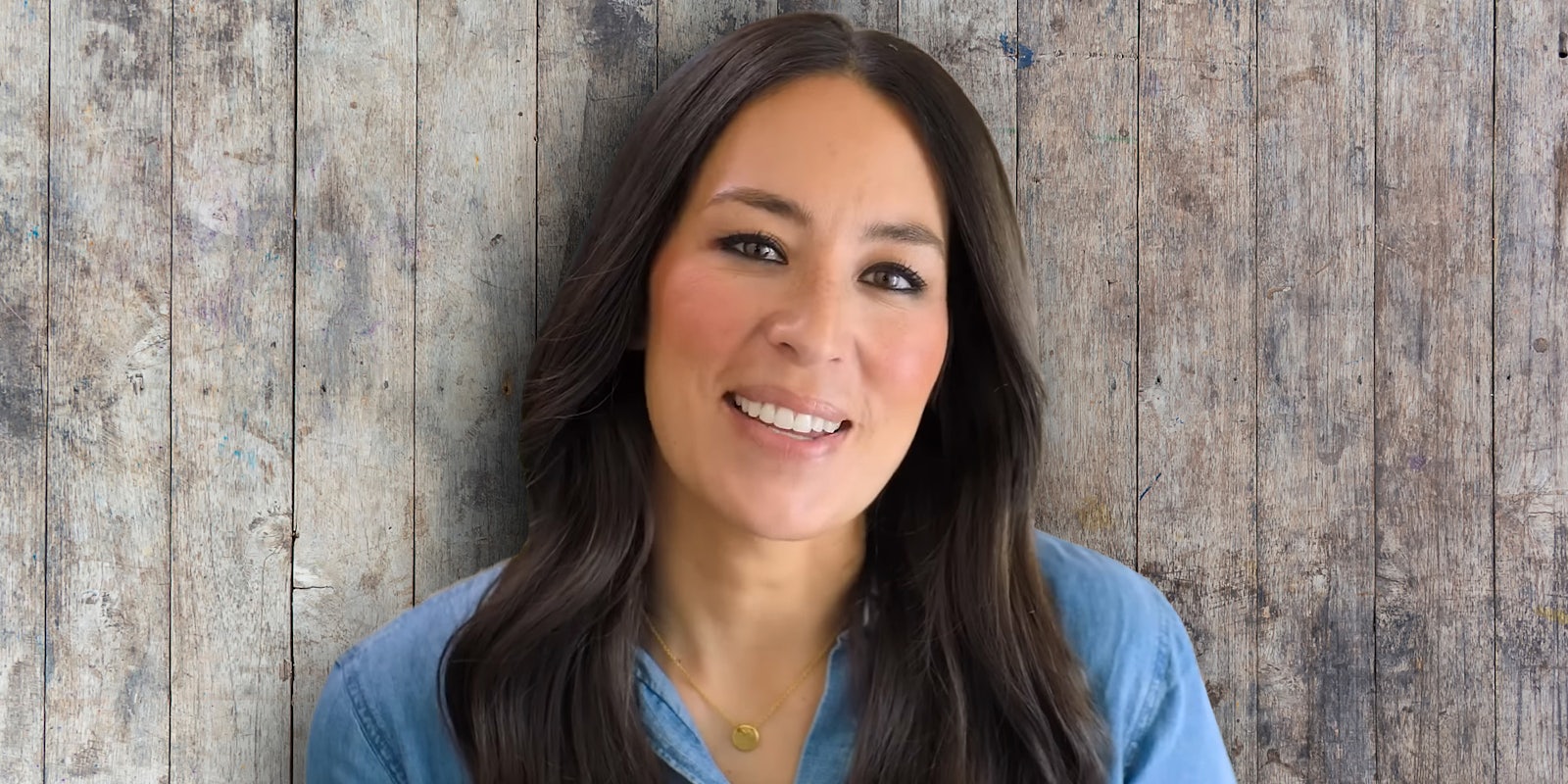In spring 2021, Kathryn Grabowski-Khairullah decided she’d had enough. She was over gray flooring. Shaker cabinets. “Bless this mess” signs. Thick coats of white paint on brick, wood, and stone. Rae Dunn mugs with the word “mug” etched into them.
That year, Grabowski-Khairullah had become a first-time home buyer. She works in the arts, but told the Daily Dot that she’d given “zero thought to home décor,” so she’d joined online groups for ideas. There she found herself awash in a sea of signs, subway tile, and fake farm supplies—much of it white, black, or gray—all common characteristics of modern farmhouse design.
It didn’t make sense to Grabowski-Khairullah that everyone wanted to live in the sparkling white aesthetic of Kim Kardashian’s home or a space inspired by the queen of shiplap, Joanna Gaines. (Shiplap is a type of board historically used on ships and exteriors that Gaines and others have repurposed for interior decorating.)
A woman who was in a group with her recalled someone posting an item they’d clearly purchased from a department store. “Everybody was applauding like she was an interior designer, like she had reinvented the color gray and Katie just lost it,” she said. “…[She was like] that’s it, I’m starting a revolution.”
Grabowski-Khairullah began telling people that they don’t have to decorate like they’re living on the set of a black and white movie set in the Great Depression with splashes of kitsch.
People did not take kindly to her suggestions.
“I got kicked out of a bunch of DIY Facebook groups for trying to recruit people to the dark side,” she said with a chuckle.
On a Saturday in March, Grabowski-Khairullah created the People Against MoDErN fArMhOuSe.
Modern farmhouse is a design style inspired by early twentieth century rural American homes. Its palette is often white, gray, and black, and heavy on signs labeling an item, part of the house, or cracking jokes—such as a sign behind a toilet that says “life is short, lick the bowl.” The home goods sections of every major department store is stuffed with modern farmhouse. You’ll find it in bars, gas stations, restaurants, hotels, Airbnbs, and more.
People who hate it find it drab and ridiculous. “How many times have I sh*t in the middle of my kitchen floor because there is no sign?” one person joked of the signage that adherents use. Some also believe that the design’s popularity is partly inspired by nostalgia for an era when white male patriarchy was more dominant in society. Thus, the most passionate detractors are often feminist, progressive, and countercultural.
Two-and-a-half years later, the People Against MoDErN fArMhOuSe (TPAMFH) has swelled from the 100 Grabowski-Khairullah estimates first joined the private Facebook group to over 165,000 members, many of whom are extremely active. (Disclosure: The writer is a member of the group.)
Most members of TPAMFH are millennial women like Grabowski-Khairullah who are sick of greige, fluent in snark, and unafraid to speak their minds. “We’re a sh*tposting group to be perfectly frank,” administrator Serena Cole told the Daily Dot. A progressive vein runs through the curated chaos that’s interspersed with jokes about “beautifully moist” horse manure and Fruity Pebbles-themed sex toys.
TPAMFH has changed a lot since launching as a motley crew united by mutual loathing for casement windows and people posing as farm animals in their maternity photo shoot. Today people are free to shame other styles, fawn over ones they love, talk politics, and roast one another so long as it isn’t hateful or bigoted. It’s sarcastic and trashy, daring and thought-provoking. TPAMFH has its own vernacular—bring up “washergate,” “buttergate,” or joke that “you’re probably being cheated on” to non-members, and you’ll be met with a blank stare at best. Members describe the group as their daily dose of serotonin, and as a refuge from grief, illness, and the drudgery of life.
It’s inspired spinoffs, such as the People Against the People Against Modern Whorehouse. There are also multiple groups dedicated to opposing TPAMFH, which they see as too mean, liberal, and raunchy.
Grabowski-Khairullah can’t believe it has come this far.
“I had no intention of the group ever even being something active at all. It was just a joke,” she said.
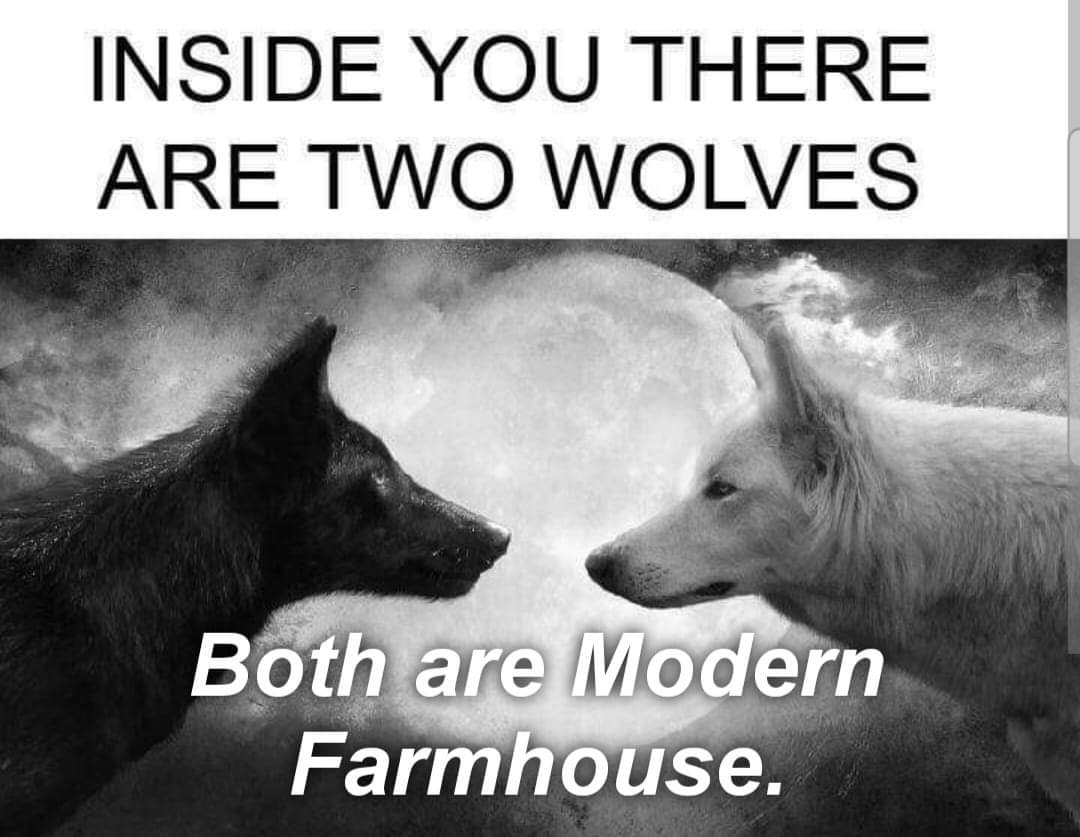
The legend of #washergate
For the first few months, TPAMFH’s membership remained static.
In the summer of 2021, they started receiving thousands of requests to join every day. Within a month, Grabowski-Khairullah estimates TPAMFH went from 100 to 100,000 members.
She suspects the group may have been tagged somewhere or that Facebook’s suggestions feature played a role—perhaps both.

“Groups are one of the things that’s keeping Facebook relevant,” she said.
For a time, TPAMFH continued as a place to simply clown on generic farmhouse style.
A year later, this was starting to feel stale to some. Moderators and administrators were also getting sick of multiple people submitting the same posts. One of the rules states that “original content is king” and warns people not to submit viral posts from other groups.
In July 2022, a washer and dryer set with a faux wood finish pushed Grabowski-Khairullah over the edge.
“OK, because you can’t listen to instructions, we’re approving every washer/dryer post for the rest of the weekend,” she wrote in the group. “#washergate22.”
Washergate consisted of the admins and mods approving the dozens upon dozens of photos of the same faux wood washer/dryer set members had submitted.
“We’re coming for women’s culture at its core,” Libs said.
Grabowski-Khairullah figured that flooding the timeline with the same photo would kill TPAMFH once and for all. And by then she didn’t much care.
“Making fun of modern farmhouse can be just as boring as modern farmhouse,” Cole explained.
Initially, people were baffled to see post after post of the same washer/dryer set. Then the confusion turned to amusement. “79 TIMES!?!?!” a member wrote. “Y’all posted those fugly washers and dryers SEVENTY FREAKING TIMES?!?? Yes. I counted. DEAD.”
“Chaos. Just chaos. Life is meaningless and everything is both nothing and the washer/dryer set. There is no in between,” another wrote.
A TikToker even immortalized the hilarity.
@bearikaballerina In a FB group I’m in. #washergate22 #facebook #thepeopleagainstmodernfarmhouse #fyp ♬ O Fortuna aus Carmina Burana – Collegium vocale Innsbruck & Vocappella Innsbruck & Jauna Muzika Vilnius & Cappella Istropolitana & Art of Brass Hans Gansch & Schlagzeugensemble Peter Sadlo
Rather than being discouraged, members took washergate as a challenge to up their game. They created memes and found myriad ways to invoke the image that has become iconic in the group.
Looking back, Grabowski-Khairullah says washergate unleashed people’s creativity and led it to evolve into what it is today.
There have been multiple “gates” since then: #buttergate, #horsechewedgate, #leavegate, and #lindagate. Inside jokes about them are plastered on memes, T-shirts, and copypasta.
“Now people live for that part of it,” Grabowski-Khairullah said.

The courage to be trolls
Millennials were the first generation that grew up in the shadow of social media and the highlight reels people pretend is their authentic self. This pressure to appear perfect is felt most keenly by women, as it has always been.
The 1900 book, Twentieth Century Etiquette, warns, “A rude, loud-spoken, uncultured woman is a positive blot upon nature, and repels, by her lack of breeding, those who would not be slow to acknowledge the real worth and talent she possesses, and which would come to the surface were she clothed in the beautiful garments of modesty, gentle speech, and ease of manner.”
TPAMFH say f*ck that.
Libs was in the first wave of members; she’d been in a décor group she describes as “one of those positively only, everybody’s got a glitter tumbler” spaces with Grabowski-Khairullah before TPAMFH.
Libs, a millennial who asked that her last name remain confidential because people “get nasty,” described the group’s ethos as a “rejection of the white glove, of sipping tea. It’s drinking whiskey and talking trash.”
“We’re coming for women’s culture at its core. We’re saying your home does not define you,” she added.
Challenging traditional gender roles is a decidedly liberal position in line with the subculture of TPAMFH. One of the rules warns “we are left leaning and will roast you if you complain when you see 

Some members left or were banned for arguing politics or complaining about political posts. A few flounced and were immortalized in TPAMFH cannon. (Flouncing is internet slang for making a melodramatic post announcing your departure from a platform or forum.) One flouncer declared that the members are a bunch of “see you next Tuesdays” who are “probably being cheated on”—much to the amusement of the group, which now uses the slogan on merchandise and in memes.
Libs described flouncers as “self-appointed cruise directors” who “walk up to the DJ booth and grab the mic” to complain about the music.
“We didn’t make an avenue for bootlicking right-wingers,” Libs added.
Some people strongly disapprove of the group’s culture. In 2022, ex-members created two opposition groups: The People AGAINST the People Against MoDErN fArMhOuSe and Tell me how you were canceled from ‘the People Against MoDErN fArMhOuSe.’ The first has 2,000 members; the second 1,000.
“This is the weirdest thing I’ve ever been a part of and I’ve been to a dungeons and dragons themed o**y,” a member of TPAMFH said.
Tell me how’s description reads, “Did you join ‘the People Against MoDErN fArMhOuSe’ to realize it wasn’t so much about décor? Did you get banned for not completely agreeing with certain ideas? Tell your story here!”
Not long after creating the People AGAINST, the admin encouraged members to report TPAMFH to Facebook, presumably in the hopes that it would get suspended.
“I got kicked out and blocked for telling someone acab wasn’t original or edgy,” a member of that group complained. “They basically burned me at the stake; acab is their entire personality over there.”
(None of the admins or moderators of the opposition groups responded to interview requests.)
Grabowski-Khairullah said that the opposition groups are “very MAGA.”
Members of TPAMFH reacted by creating groups to troll the haters, such as Have you been personally victimized by the People Against MoDErN fArMhOuSe? The description jokes that, if so, “you may be entitled to compensation.”
Both sides also infiltrated one another to mine them for content to screenshot and take back to their respective group.
“This is some weird stuff between these groups,” a member of the People AGAINST complained. “I’m leaving this one as well.”
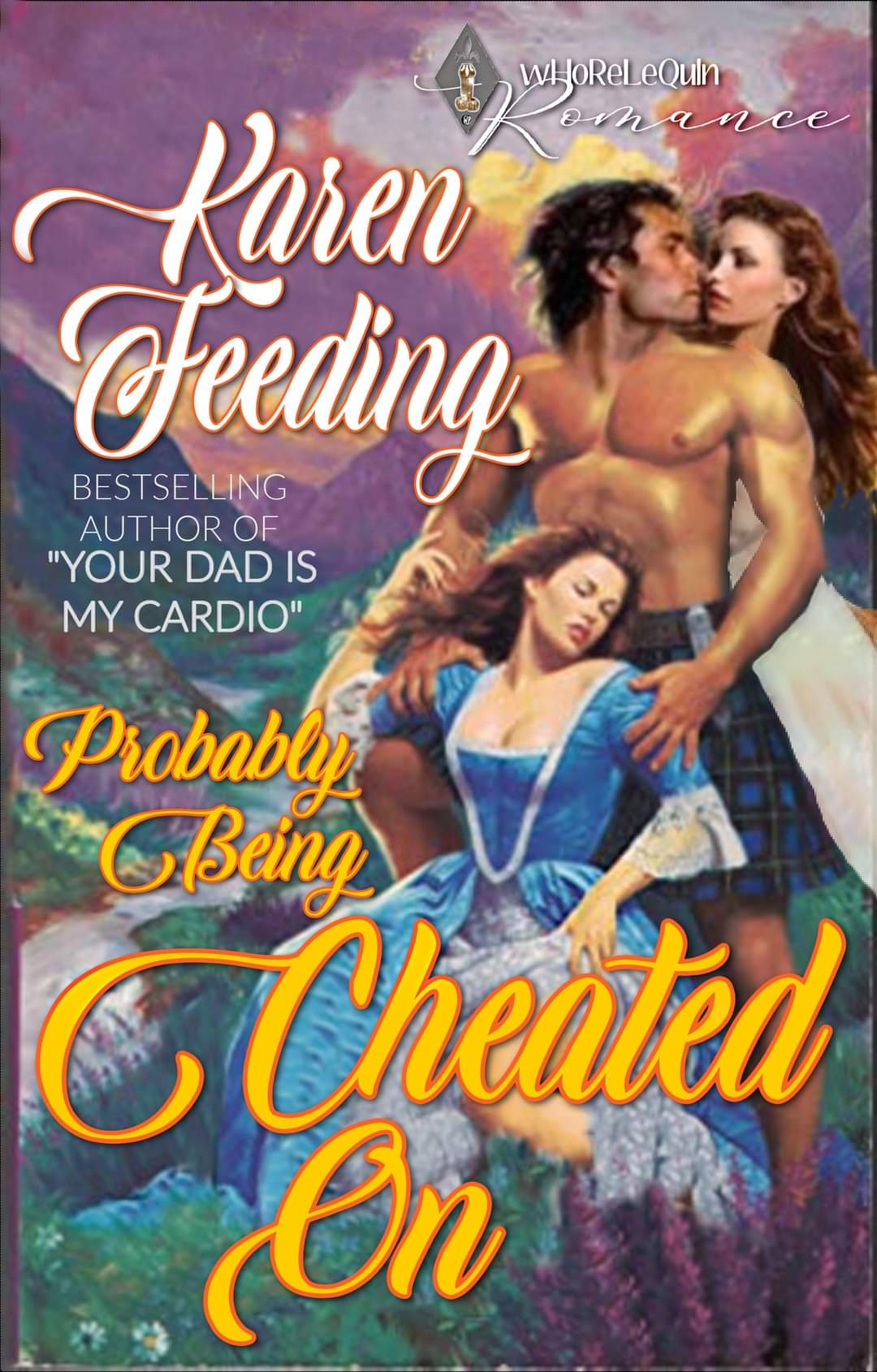
The Farmhouse Factory™
It isn’t as overly political as MAGA wallpaper, but some members of TPAMFH believe modern farmhouse, which harks back to rural American homes from a century ago, invokes conservative ideals of the “good ol’ days.”
“A lot of people on the right have a delusion of a simpler time, a better time. That time may have been simpler and better for wealthy white men, but not the rest of us,” admin Murphy said.
The New York Times recently described modern farmhouse as “today’s McMansion” in an article that mentioned TPAMFH and quoted Grabowski-Khairullah. Some see it as clean, chic, and comforting; others find it cold, drab, and meh.
Cole lives in a subdivision filled with the style. She said that some of her neighbors’ houses look like no one lives there, as if they’re still staged for sale, which she finds “disconcerting.”
Cole, who describes herself as “the weird pink-haired girl” in the neighborhood, said, “If I have one more person tell me I’m destroying the resale value in my home, I might punch somebody in the face…. I feel like people expect you to keep your home for the next owner.”
Multiple members of TPAMFH opined that the style’s popularity is based in part on the presumption that it makes a home easier to sell.
“In this housing market, sellability and palatability is pushed so much on us that people are just like neutrals, neutrals, neutrals, don’t insert your own ideas into your house because you want to be able to sell it,” Grabowski-Khairullah said.
“She said she wanted to scream, ‘it’s not a whorehouse it’s a whorehome,’” Murphy recalled.
There is some logic to this. The average homeowner reportedly owns at least three houses throughout their life. Years past, people were more likely to only own one home in a lifetime.
Watch any house flipping or redecorating show and you’ll see that designs like the avocado green and harvest gold kitchens of the 1970s or 1980s florals are typically the first thing to get ripped out and painted white.
Murphy, who works in the mortgage industry, thinks this is a mistake.
“Those homes that are vintage go for way more than the ones that are vintage on the outside and gutted on the inside,” Murphy told the Daily Dot. “…There’s a ton of people our age who are in search of unique homes, homes with character.”
In a way, modern farmhouse reflects the commercialization of residential real estate and the idea of a house as an asset like a 401k. Real estate is traditionally one of the safest investments.
Something intangible gets lost when you sell your home, however. Murphy is still pained to think of the ranch-style Los Angeles home that belonged to her family for half a century before they sold it.
“They say it’s just a house, but most of my memories are in that house,” she said.
Many millennials have fond memories of meals shared in those 1970s kitchens or recall watching Saturday morning cartoons in a living room that looked like a time capsule from 1962.
Will their children and grandchildren ever know the sensation of walking into a room that contains a lifetime of memories? Or will the closest they get to that feeling be when they encounter modern farmhouse decades hence and experience a vague sense of déjà vu that isn’t specific to a particular place?
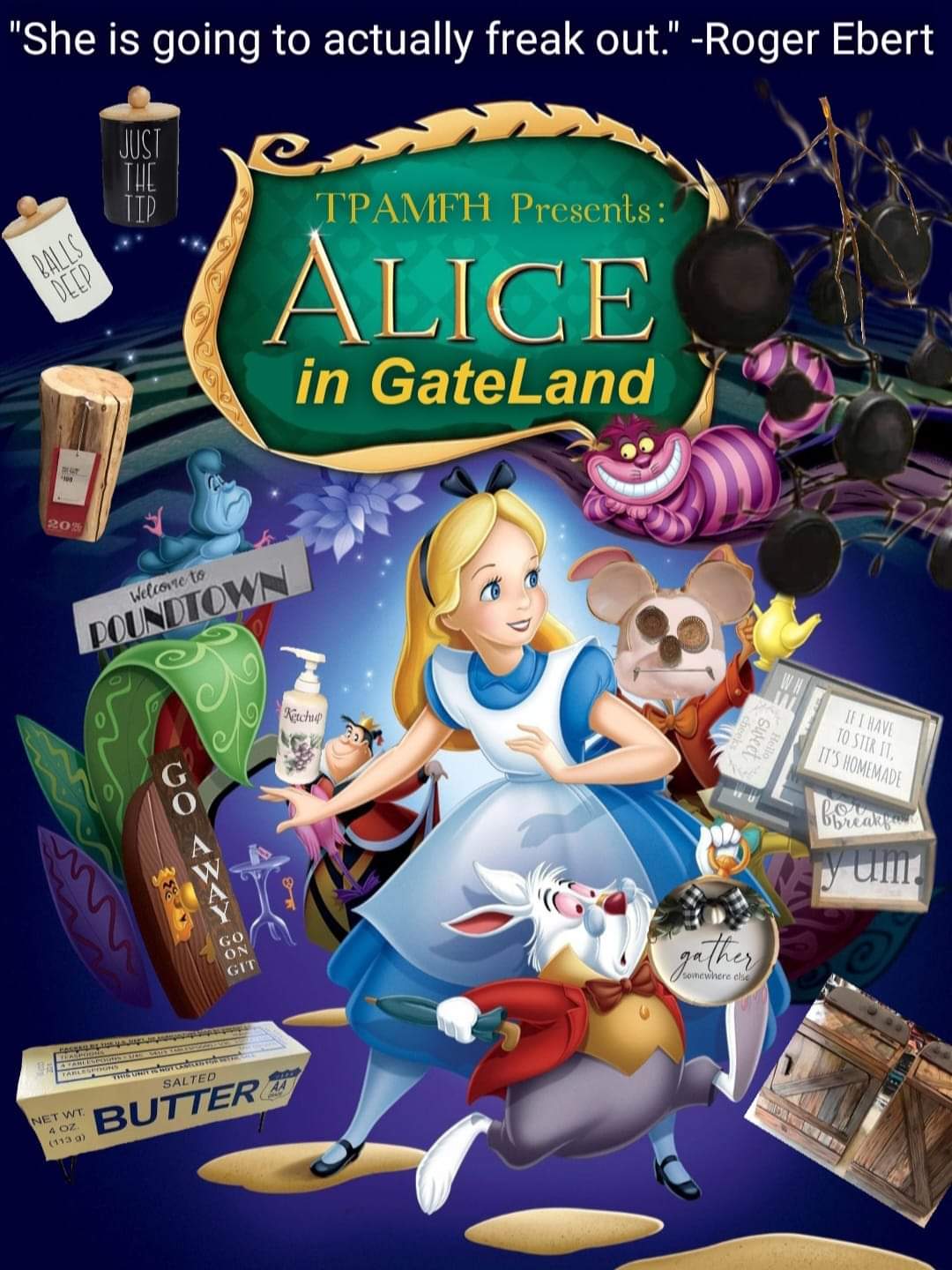
A heroine forged in chaos and snark
This March, the sh*tposters of TPAMFH met their queen: A Boomer named Linda.
Linda joined the group after seeing it tagged elsewhere. It was in the midst of one of the gates that have come to be an indelible fixture of the culture.
One of the rules proclaims that original content is king. Gates happen when members all post the same thing, albeit with a twist. Linda decided to jokingly call them out for breaking their own rule. “I expected better,” she wrote.
She also posted a screenshot of the rule in comments on multiple posts.
The members came for her.
“I guess it just wasn’t nuanced enough, so after that I thought eh,” Linda told the Daily Dot. “Then I thought, no, I can’t give them the satisfaction of just quitting because they’d have a field day.”
Linda got tagged in a bunch of posts trolling her. She didn’t respond, instead simply untagged herself.
Eventually it dawned on people that they had been out-trolled.
“She was victorious,” Grabowski-Khairullah said fondly. “She was mean to us to the extent that was just so witty and creative and her technological skills surprised everyone and she just played along so well and basically everyone decided we don’t hate Linda, we love Linda, Linda is how we want to be someday.”
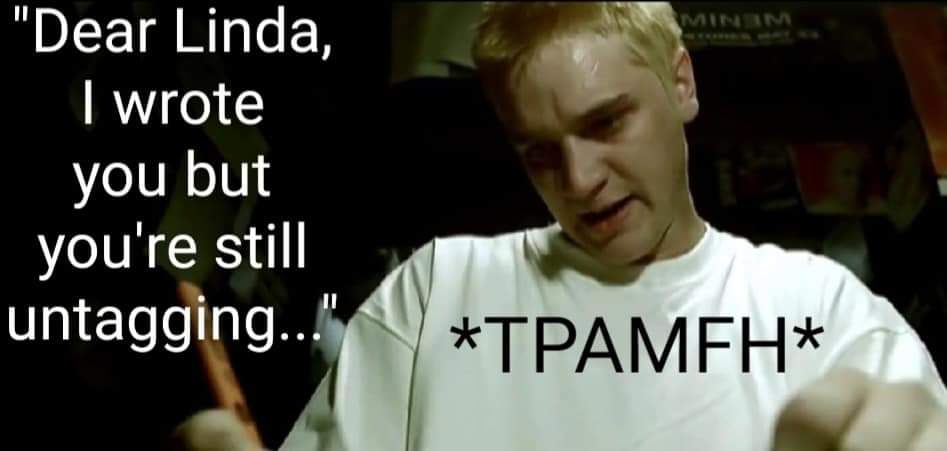
People began begging Linda to come back.
As Linda haters turned to Linda stans and posts about her filled the feed, people who made the mistake of going a day or two without opening Facebook were extremely confused to return to find the group had become a Linda fan page.
“Linda. Who the f*ck is Linda?” one wondered. Linda responded, “I’m the one who put the MF in TPAMF.”
With her legend rapidly growing, a couple weeks later, Linda agreed to do an ask me anything (AMA). It was a hit. People claimed they canceled plans and skipped family obligations just to be there. So many joined the chat that they had to keep kicking people out to make room for others. Still it kept crashing.
“This is the weirdest thing I’ve ever been a part of and I’ve been to a dungeons and dragons themed o**y,” one wrote.
“I was so proud,” Linda said of reading that message.
At the end of the AMA, Linda, who said that she comes from a family well-versed in sarcasm, wrote to her adoring public, “I’d like to say that this has been a pleasure. But you people mean nothing to me.”
Months later, Linda is still blown away by the experience. “Two thousand people were interested in hearing what I had to say. Why, I don’t know. I’m a volunteer at a local performing arts center,” she said.
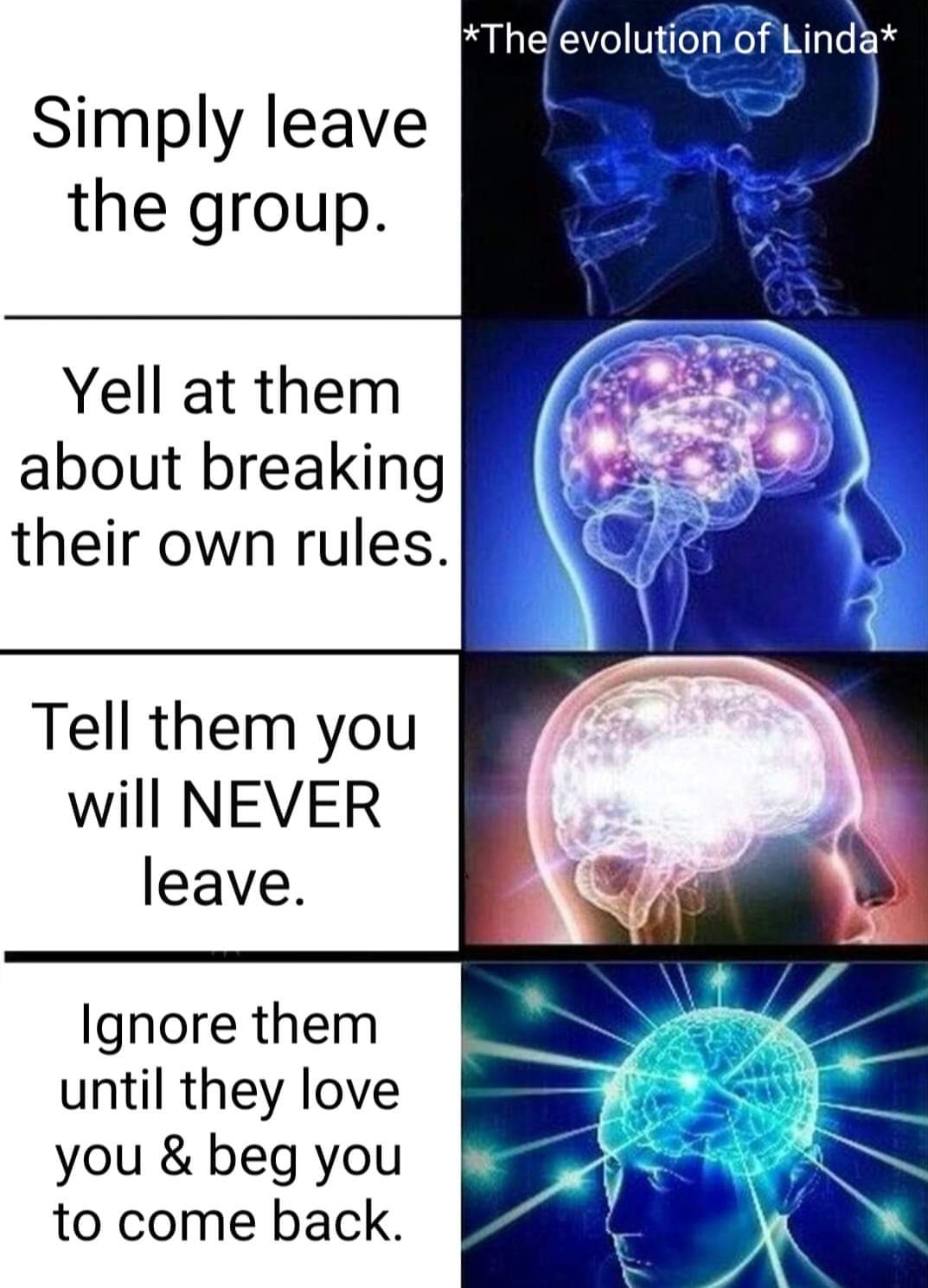
‘Fight club’ for millennial sh*tposters
The People Against MoDeRn fArMhOuSe struggle to explain the group to most outsiders, but everyone who talked to the Daily Dot said that it’s become one of their favorite places on the internet. Many have made friends. Linda met a long-lost relative.
“People live for this group, myself included,” Grabowski-Khairullah said.
TAPMFH is just one of the 10 million Facebook groups. It’s nowhere near as large as even some groups also dedicated to trashing home décor or design, but having 165,000 members places it in the size range of a small city. Nevertheless, to members, it’s a sacred space to hang out, have a laugh, and enjoy the mutual weirdness—including when they’re not scrolling the comments or creating a meme that only makes sense if you’re part of the subculture.
“The thing I love most about the group is the camaraderie,” Murphy said.
One night Murphy was in the emergency room. It was freezing, so she asked her mother to get a shirt from her car. Her mother returned with a “modern whorehouse” shirt from the group’s store.
No one said anything, but Murphy said the looks were “priceless.”
“It brought levity to a tough situation. It made me laugh,” she said.
She shared a story about one member seeing another wearing a people against modern farmhouse T-shirt out shopping. “She said she wanted to scream, ‘it’s not a whorehouse it’s a whorehome.’”
Murphy said that story makes her feel like she’s in Fight Club—albeit a version in which fists are replaced with memes about “live laugh love.”
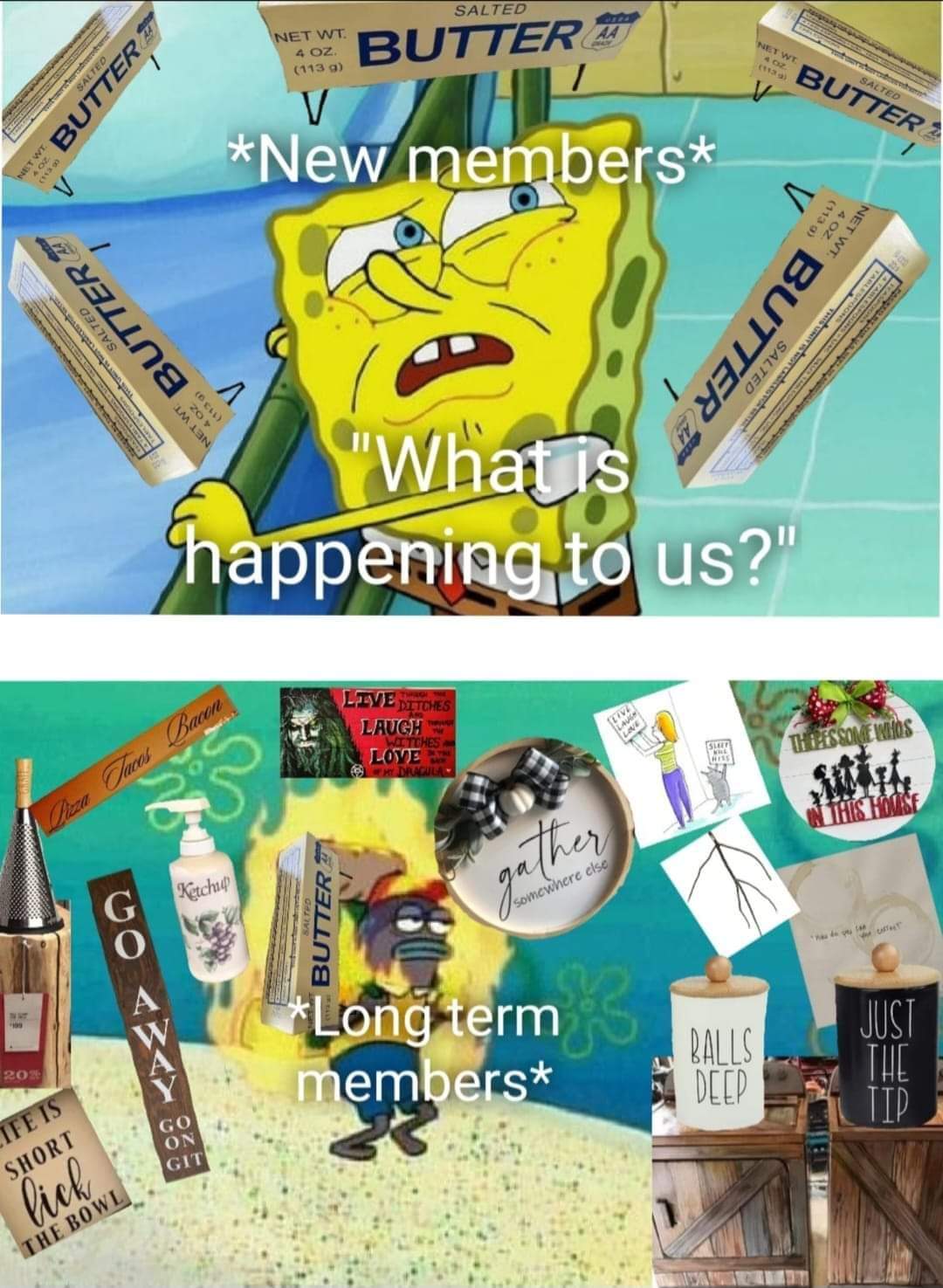
Modern farmhouse fans will occasionally wander in. Reactions are decidedly mixed.
“People who are of a softer, gentler makeup don’t do well with the degree of shaming and sarcasm that others of us with thicker skin may not only handle but enjoy,” Linda explained.
Some influencers have joined the group and found their posts getting roasted. Some can handle it; some can’t. Cole said that one would message people because they were mad about their content getting dragged.
Grabowski-Khairullah couldn’t confirm their relationship, but a person who said they were one of Rae Dunn’s friends was a member for a while.
“She was very supportive of her friend…. She wasn’t super mad at us; she just thought we were all being jerks, which we are,” Grabowski-Khairullah said.
Very few things are off limits, so anyone who posts risks getting dragged. People who love the group say that’s part of the fun.
“If you can’t laugh at yourself, you do not deserve to laugh at anyone else … being a troll is a privilege,” Libs said.
It is a shaming group, after all. One of the policies says, “We do not claim to be nice.”
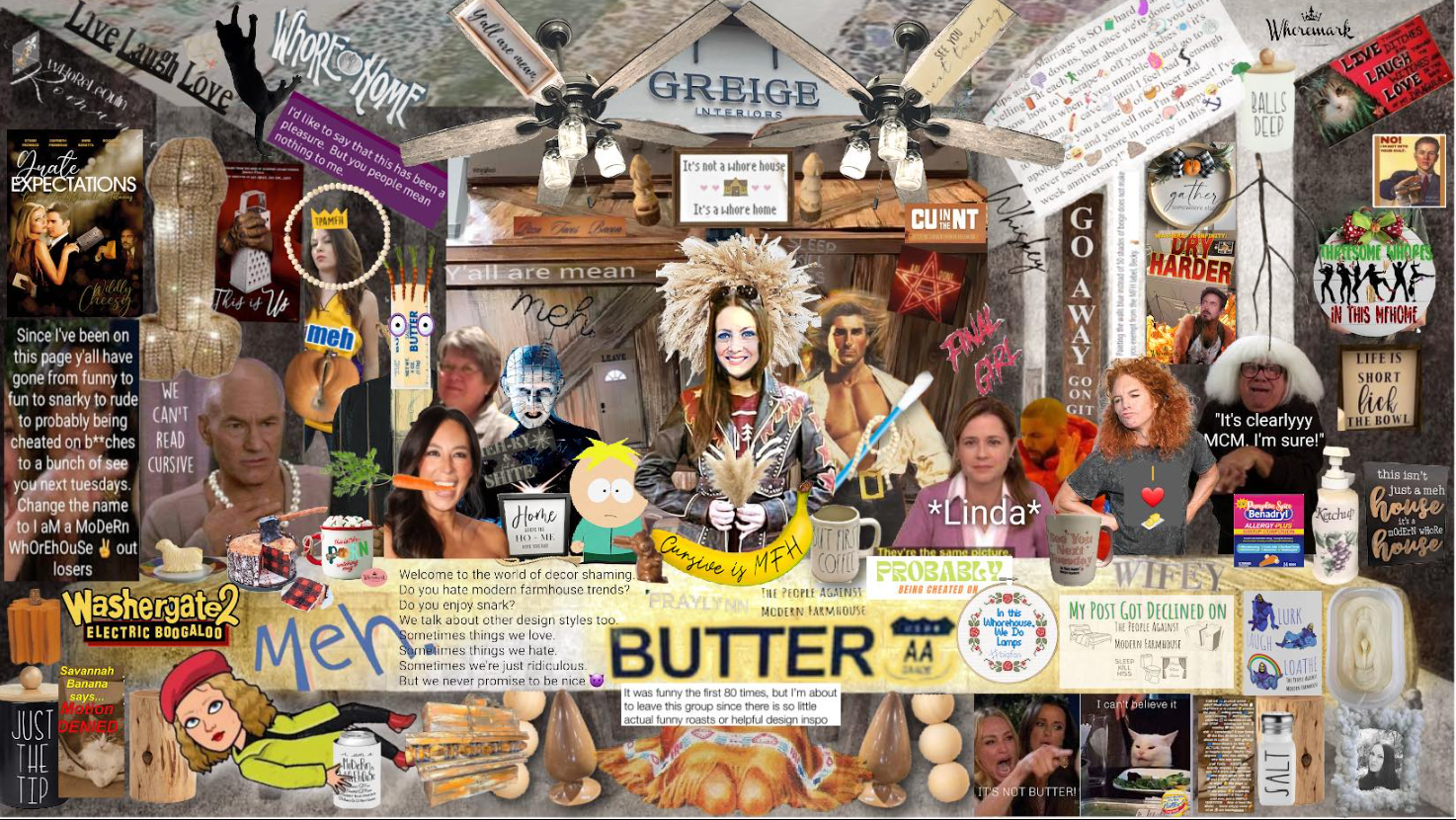
Members who spoke to the Daily Dot agreed that they’re the nicest bunch of see you next Tuesdays (code for “c*nt”) that you’ll ever meet. They’ll roast your kitchen cabinets then offer to cook you dinner.
“They’re really adept at being sarcastic and edgy but they’re also adept at being kind,” Linda said.
Styles come, and styles go. One day modern farmhouse will be a memory peeking out of a discount bin or on the shelf at a secondhand shop. There are indications that a midcentury modern revival is edging in on territory of shiplap walls, signs that say “go on git,” and blindingly white subway tile.
What will come of TPAMFH when that inevitably happens?
“I think we’ve moved beyond just hating modern farmhouse,” Murphy said. “We’ve established such a chaotic random environment. I hope we outlast modern farmhouse.”
Send Hi-Res story tips and suggestions here.


